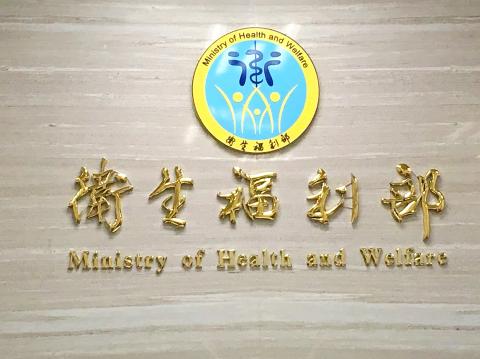The Presidential Office, the ministries of health and welfare, foreign affairs and the Interior, as well as the Financial Supervisory Commission, were the government agencies most targeted by hackers last year, a high-level government source said.
The government classifies information security incidents into four levels based on their severity, with level 1 being the lightest and level 4 being the most severe.
A level 1 incident involves temporarily disabling or defacing a Web page, while level 2 and level 3 incidents refer to crashing the secondary and the main system respectively.

Photo: Lin Yen-tung, Taipei Times
Taiwan has not had a level 4 incident, which would be when the core systems of more than one government agency crash, and state secrets are stolen.
Last year, 151 incidents were reported by ministries and agencies overseen by the Executive Yuan — 116 level 1 incidents, 31 level 2 incidents and four level 3 incidents — government data showed.
Malware was found last year in the health ministry’s core information security system, which had apparently been implanted to steal information on Taiwanese covered by the National Health Insurance (NHI) program, a senior government official said on condition of anonymity.
“Fortunately, we were able to stop the level 3 attack before the NHI information could be snatched,” the official said, adding that Chinese hackers were believed to be behind the attack.
The foreign ministry, the interior ministry and the commission all experienced a level 3 attack last year, the official said.
The attack on the foreign ministry targeted the travel information of Taiwanese registered with the Bureau of Consular Affairs, while the interior ministry’s automatic immigration clearance system at the nation’s airports was hit, the official said.
Hackers targeting the commission stole NT$1.8 billion (US$60.27 million at the current exchange rate) from Far Eastern International Bank (遠東商銀), they said.
The Presidential Office was targeted seven times — six at level 1 and one at level 2.
The cyberattacks targeting its information security system had a low success rate thanks to its extensive protection measures, they said.

INVESTIGATION: The case is the latest instance of a DPP figure being implicated in an espionage network accused of allegedly leaking information to Chinese intelligence Democratic Progressive Party (DPP) member Ho Jen-chieh (何仁傑) was detained and held incommunicado yesterday on suspicion of spying for China during his tenure as assistant to then-minister of foreign affairs Joseph Wu (吳釗燮). The Taipei District Prosecutors’ Office said Ho was implicated during its investigation into alleged spying activities by former Presidential Office consultant Wu Shang-yu (吳尚雨). Prosecutors said there is reason to believe Ho breached the National Security Act (國家安全法) by leaking classified Ministry of Foreign Affairs information to Chinese intelligence. Following interrogation, prosecutors petitioned the Taipei District Court to detain Ho, citing concerns over potential collusion or tampering of evidence. The

NEGOTIATIONS: Taiwan has good relations with Washington and the outlook for the negotiations looks promising, Minister of Economic Affairs J.W. Kuo said Taiwan’s GDP growth this year is expected to decrease by 0.43 to 1.61 percentage points due to the effects of US tariffs, National Development Council (NDC) Minister Paul Liu (劉鏡清) said at a meeting of the legislature’s Economics Committee in Taipei yesterday, citing a preliminary estimate by a private research institution. Taiwan’s economy would be significantly affected by the 32 percent “reciprocal” tariffs slapped by the US, which took effect yesterday, Liu said, adding that GDP growth could fall below 3 percent and potentially even dip below 2 percent to 1.53 percent this year. The council has commissioned another institution

NEGOTIATIONS: The US response to the countermeasures and plans Taiwan presented has been positive, including boosting procurement and investment, the president said Taiwan is included in the first group for trade negotiations with the US, President William Lai (賴清德) said yesterday, as he seeks to shield Taiwanese exporters from a 32 percent tariff. In Washington, US Trade Representative Jamieson Greer said in an interview on Fox News on Thursday that he would speak to his Taiwanese and Israeli counterparts yesterday about tariffs after holding a long discussion with the Vietnamese earlier. US President Donald Trump on Wednesday postponed punishing levies on multiple trade partners, including Taiwan, for three months after trillions of US dollars were wiped off global markets. He has maintained a 10 percent

TRADE: The premier pledged safeguards on ‘Made in Taiwan’ labeling, anti-dumping measures and stricter export controls to strengthen its position in trade talks Products labeled “made in Taiwan” must be genuinely made in Taiwan, Premier Cho Jung-tai (卓榮泰) said yesterday, vowing to enforce strict safeguards against “origin laundering” and initiate anti-dumping investigations to prevent China dumping its products in Taiwan. Cho made the remarks in a discussion session with representatives from industries in Kaohsiung. In response to the US government’s recent announcement of “reciprocal” tariffs on its trading partners, President William Lai (賴清德) and Cho last week began a series of consultations with industry leaders nationwide to gather feedback and address concerns. Taiwanese and US officials held a videoconference on Friday evening to discuss the